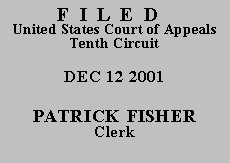

| UNITED STATES OF AMERICA,
Plaintiff-Appellee, Defendant-Appellant. |
No. 01-6052
(D.C. No. 99-CV-506-L) |
Mr. Clayton was arrested and charged with possessing cocaine with intent to distribute and conspiring to commit money laundering. On December 2, 1997, he pled guilty pursuant to a plea agreement to one count of cocaine possession and distribution under 21 U.S.C. 841(a)(1), and one count of money laundering under 18 U.S.C. 1956(h).
Before Mr. Clayton was sentenced, the government prepared a presentence investigation report. Mr Clayton filed certain objections to the report, including objecting to an assertion in the report that he had sold cocaine base over a continuous period of time to a Steve Carter. In his objection, Mr. Clayton asserted that while he had sold cocaine powder, he had never sold cocaine base. The government responded that Mr. Carter would be a witness at the sentencing hearing.
At the hearing on April 24, 1998, the government made a motion for a downward departure in sentencing and Mr. Clayton withdrew his objections to the presentence report. The court granted the government's motion for a downward departure and sentenced Mr. Clayton to two sentences of 118 months, the sentences to run concurrently. Mr. Clayton did not directly appeal his conviction or sentence.
In this action, Mr. Clayton brought a section 2255 motion to correct or vacate his sentence, claiming that he was deprived of his right to the effective assistance of counsel. He alleged his counsel was constitutionally ineffective for withdrawing or failing to raise certain objections to the presentence report. The district court denied the motion, holding that counsel's decision to drop all objections to the sentence report was strategic. The court further held that all of the objections lacked merit, and therefore Mr. Clayton could not demonstrate prejudice.
We must determine whether Mr. Clayton is entitled to a COA. In so determining, we examine whether he has made a substantial showing of the denial of a constitutional right. See 28 U.S.C. § 2253(c)(2).
Ineffective assistance of counsel is a mixed question of law and fact that we review de novo. Strickland v. Washington, 466 U.S. 668, 698 (1984). We review the district court's underlying findings of fact for clear error. Id. To show counsel was constitutionally ineffective, Mr. Clayton must demonstrate that counsel was both deficient and that counsel's deficient performance prejudiced the defense. Id. at 697.
Counsel's performance is deficient only if it falls below "objective standards of reasonableness." Id. at 688. Moreover, where counsel has made an informed strategic choice, counsel's performance must be completely unreasonable, not merely wrong. See Hoxsie v. Kerby, 108 F.3d 1239, 1246 (10th Cir. 1997). See also Moore v. Reynolds, 153 F.3d 1086, 1104 (10th Cir. 1998) (defendant must show counsel's performance was something other than "an informed strategic choice.").
The district court found here that counsel withdrew all objections to the presentence report "in light of" the government's motion for a downward departure. Rec., doc. 44 at 1. This finding is supported by the sentencing transcript. Sent. Hrg Tr. at 33-34. Moreover, in its response to Mr. Clayton's section 2255 petition, the government attached an affidavit from Mr. Clayton's attorney detailing his discussions with Mr. Clayton regarding whether to waive his objections to the presentence report. Among other things, Mr. Clayton's counsel advised him that if he wished to pursue his objections, there would be an evidentiary sentencing hearing at which witnesses for the government would be cross-examined and Mr. Clayton could testify. He also told Mr. Clayton he had been informed by the government that if Mr. Clayton persisted in his objections, the government would withdraw its motion for a downward departure. Finally, Mr. Clayton's counsel averred that he had thoroughly discussed with Mr. Clayton the pros and cons of going forward with the objections versus obtaining the government's support for a downward departure, and the fact that the degree of downward departure was solely within the sentencing judge's discretion. Aff. of Ben F. Meek, III, Rec., doc. 38 (attachment). Mr. Clayton did not refute these assertions by his counsel. See Movant's Resp. to Gov't's Answer. Rec., doc. 39. Thus, the record amply supports the conclusion that counsel's decision was a strategic one that was fully discussed with Mr. Clayton.
A strategic trial decision constitutes deficient performance by counsel only if it was completely unreasonable. Hoxsie, 108 F.3d at 1246. Having reviewed the merits of the objections Mr. Clayton raised, we are not convinced that counsel's decision to forgo these objections to gain the benefit of a downward departure in sentencing was completely unreasonable.
We conclude Mr. Clayton has raised no arguments that require further proceedings, are debatable among jurists, or are subject to a different resolution on appeal. See Barefoot v. Estelle, 463 U.S. 880, 893 n.4 (1983); see also Slack v. McDaniel, 529 U.S. 473, 484 (2000). Accordingly, Mr. Clayton has not made a substantial showing of a denial of a constitutional right. 28 U.S.C. § 2253(c)(2).
For the foregoing reasons, we DENY appellant's request for a certificate of appealability and DISMISS this appeal.
ENTERED FOR THE COURT
Stephanie K. Seymour
Circuit Judge
*.After examining appellant's brief and the appellate record, this panel has determined unanimously that oral argument would not materially assist the determination of this appeal. See Fed. R. App. P. 34(a)(2) and 10th Cir. R. 34.1(G). The case is therefore submitted without oral argument. This order and judgment is not binding precedent, except under the doctrines of law of the case, res judicata, or collateral estoppel. The court generally disfavors the citation of orders and judgments; nevertheless, an order and judgment may be cited under the terms and conditions of 10th Cir. R. 36.3.